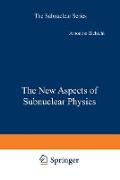- Start
- The New Aspects of Subnuclear Physics
The New Aspects of Subnuclear Physics
Angebote / Angebote:
In August 1978 a group of 80 physicists from 51 laboratories of 15 countries met in Erice to attend the 16th Course of the International School of Subnuclear Physics. The countries represented at the School were: Austria, Denmark, Federal Republic of Germany, Finland, France, Israel, Italy, the Netherlands, Sweden, Switzerland, South Africa, Turkey, the United Kingdom, The United States of America, and Yugoslavia. The School was sponsored by the Italian Ministry of Public Education (MPI) , the Italian Ministry of Scientific and Technological Research (MRSI) , the North Atlantic Treaty Organization (NATO), the Sicilian Regional Government, and the Weizmann Institute of Science. As usual, the Course was devoted to a review of the most out standing problems and results in Subnuclear Physics, with particular emphasis on the new aspects, there were mainly two: supersymmetry and electroweak interactions. In his famous lecture at Erice in 1967, Sid Coleman reviewed "All possible symmetries of the S matrix. " All but one, namely that which tells you: if you have a fermion you must have a boson. This is super symmetry , and this produces the superspace, i. e. an entity which has not only the Einstein-"bosonic" coordinates, but also "fermionic" coordinates. From superspace we get supergravity, and this means that one day we should be able to detect not only the graviton (with spin 2) but also the gravitino (spin 3/2). If we add "flavour", "colour", and "family" as other intrinsic degrees of freedom, we get extended supergravity.
Folgt in ca. 5 Arbeitstagen
